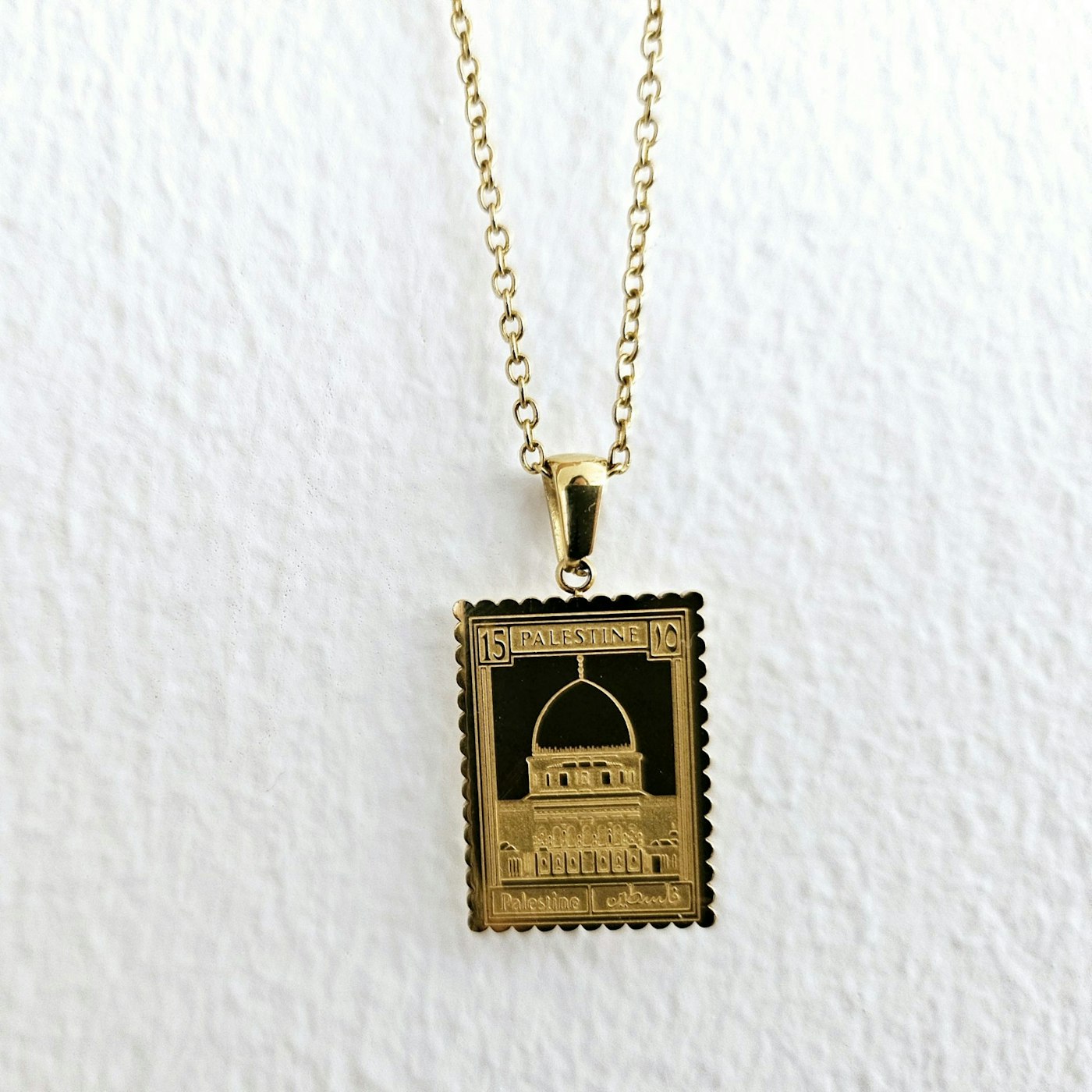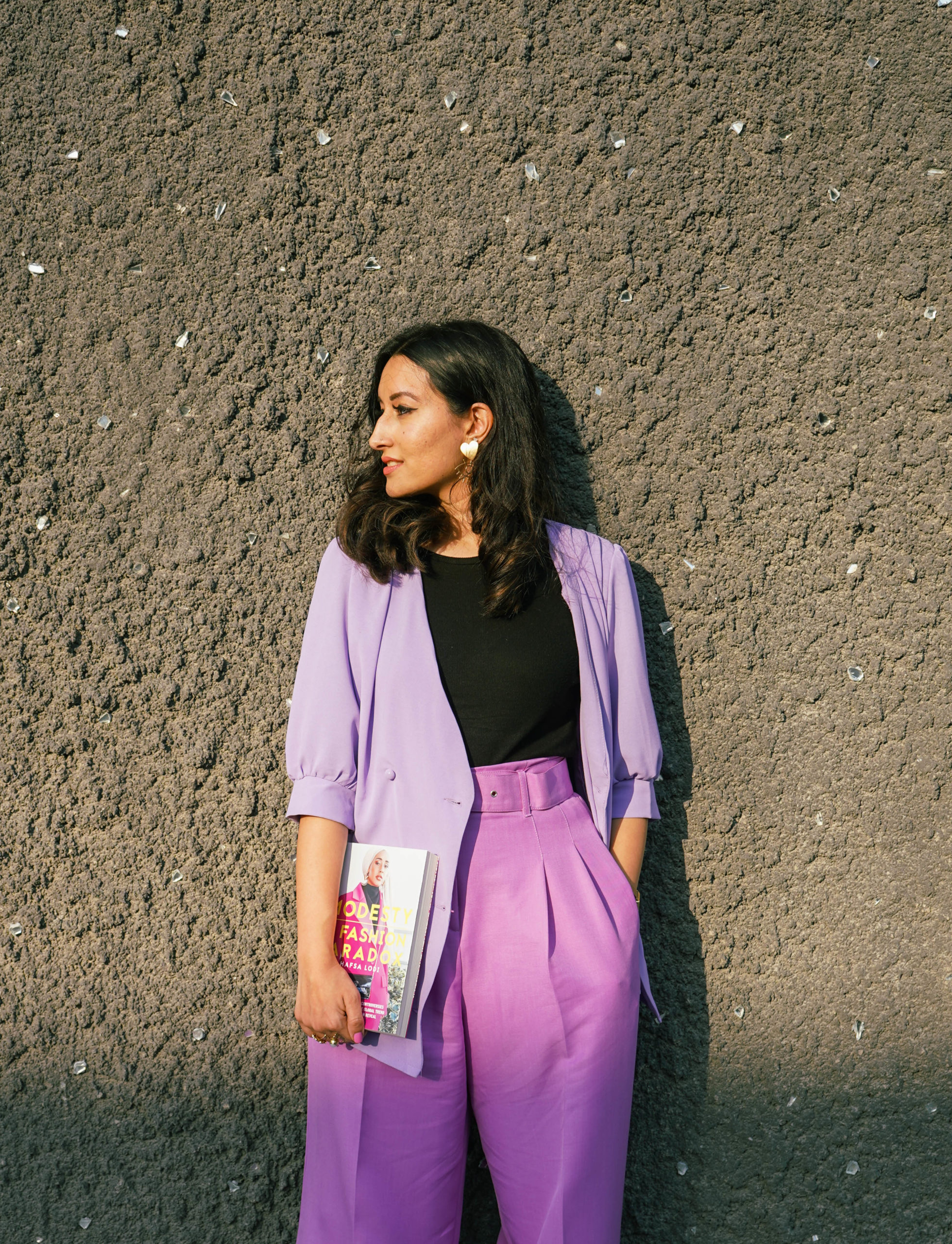Why Millennial and GenZ Muslims Are so Passionate About Palestine
by Hafsa Lodi in Culture & Lifestyle on 1st November, 2023

Despite unprecedented crackdowns on pro-Palestinian support across the globe, young Muslims are rising in solidarity with the people of Gaza. Here’s why:
It’s the morning of Monday, October 30th. As I open my jewellery box, I instinctively reach for a gold pendant in the shape of a postage stamp. It’s engraved with “Palestine” in both English and Arabic, and depicts an engraving of the iconic Dome of the Rock in Al Aqsa Mosque in Jerusalem. The necklace has become a permanent fixture around my neck this past week; an ever-present reminder of the horrors currently unfolding in Gaza.
I know what you are thinking. Wearing a necklace will do absolutely nothing for the Palestinian people whose homes are being pummeled by bombs. Wearing it as any sort of show of solidarity is frivolous and performative; it will do nothing to assuage the guilt, helplessness and hopelessness my friends and I feel for the people of Gaza. Guilt for the inaction we’re able to take to physically help them; helplessness because we can see how dire the situation is; hopelessness because we understand that the entire world has abandoned them.
Palestine is a topic that tugs at the heartstrings of many millennial Muslims. Flaunting Palestinian flag stickers on our cars and laptops and keffiyeh scarves over our shoulders, we’re far more passionate about Palestine than our parents ever were. Perhaps it’s because they have grown disillusioned with the conflict that’s been raging on for the entirety of their lives, coupled with the fact that their generation never had access to firsthand footage of the travesties at their fingertips. Doom Scrolling has taken on a whole new meaning over the past week, as we witness what appears to be an ethnic cleansing of Palestinians – “collective punishment” in response to Hamas’s attack on southern Israel.
I have no family or close friends from Palestine. I have never been to Israel; I have no tangible connection to the land. Yet, like other Muslims of my generation, I feel an innate passion when it comes to Palestine. It’s a feeling of connectedness I’ve never attempted to explore or explain – until now. As a writer I hope that putting my words on paper will help me understand what fuels my fervour for this land I’ve never stepped foot on.
There is of course, the religious significance: the Holy land, according to Muslim belief, was the home of many Prophets, from Abraham to Jesus. It’s home to Al Aqsa Mosque – the first direction of prayer for Muslims, and the site of the Prophet Muhammad’s ﷺ miraculous night journey to heaven. The land is a special one for all three Abrahamic faiths and its history is complex, but Gazan rapper Saint Levent distils it in this helpful video.
I’m American by citizenship and Pakistani by heritage – yet I share no meaningful political identity with either of these countries. Many of us Arabs and South Asians in the diaspora feel disillusioned and disconnected with the politics running our own countries of origin. Lacking any sense of nationalism, we align ourselves with the cause that feels closer to our hearts. The Palestinian one.
We’re cancelling celebrities we previously idolised for their disregard of Palestinian lives, like Kim Kardashian, Justin Bieber and LeBron James – we’re ripping off our Skims, wiping our Spotify accounts of their albums and tossing their jerseys in the bin.
Our automatic allyship with Palestinians is often a response to the Islamophobia we’ve experienced on smaller scales throughout our lives.These include the caricaturing of Muslims in mainstream media, the prejudices and microaggressions we face because of our Arabic names, our brown and black skin and our visibly Muslim appearances.
Despite the progress we have made in shattering stereotypes in recent years, such as having hijabi models on runways, Arabic lyrics in rap songs and, Muslim superheroes in Marvel movies; all of it means nothing when Palestinians are dehumanised and deemed unworthy of urgent rescue simply because of their Muslimness.
Over the past few weeks, it feels like any progress we’ve made has regressed decades. Reports show that Islamophobia and anti-Arab sentiment is already back on the rise in the US, where we, as Muslims, have worked for years to build a reputation as a model minority community after 9/11. On October 15, a 6-year-old Palestinian-American boy was stabbed to death in Illinois in a confirmed anti-Muslim hate crime, and other Muslims been attacked or threatened, across North America In the UK meanwhile, Islamophobic offences have reportedly increased 140% since October 7.
Even if the people of Palestine weren’t majority-Muslim, we would be just as vocal as we are now. We insist it’s a humanitarian issue; not just a Muslim issue.
In the Quran, Allah SWT tells us,
“O believers! Stand firm for justice.” (Surah An Nisa 4:135)
But with borders to Gaza closed, what can we do? In the framework of Islamic ethics, it’s evident that resistance becomes an obligation for every Muslim when faced with occupation and injustice. So how do we enact our activism effectively, especially when our governments ban pro-Palestine rallies and flags, and our employers threaten to fire us for our pro-Palestine posts on social media? While we can contribute financially and hope the aid penetrates the Gaza blockade; we can also update our Instagram stories with a flurry of reposts, quotes, infographics (and in the process get shadowbanned) – anything that emphasises the dire situation in Gaza right now. But it just doesn’t feel enough.
My generation of Muslims will be forever changed by watching this war unfold before our eyes. We have woken up to the reality that the world is driven by money and politics, rather than a genuine regard for human life. We’ve witnessed events on the screens of our phones that are unspeakable. But if we refrain from speaking about these atrocities, are we any different than those seeking to silence Palestinian voices?
In times like these, it’s essential to amplify voices with more knowledge and access. Palestinian activists like Subhi Taha and Gazan Girl are essential accounts on social media that are filling the void left by mainstream media. We have lost our trust in traditional news platforms as they have often proven to be one-sided, running unverified headlines and then trying to backtrack when the damage is already done. The only reliable news is now the one in our hands – the accounts sharing unfiltered footage straight from Gaza, where the death toll is climbing; and the number of bodies is so high that they’re being stored in ice cream trucks.
We see the harrowing images of bodies, majority of which are women and children, splayed across the floors of over-run hospitals lacking the resources and medicines to treat them, while facing evacuation orders , because more bombs are coming, as well as an impending ground invasion.We see the bleeding, crying children, who have been orphaned in the instant it takes for a bomb to raze an entire building. We witness heartbreaking scenes, bodies that aren’t even bodies yet, but foetuses, the sight of which makes me want to hurl my phone across the room. It’s difficult to stay composed when inundated with such graphic, traumatising content. But at the same time, it’s important to think critically about how we react and use our voices.
Conflating one political movement or organisation with an entire nation, or engaging in heated social media debates with strangers that negate the compassion and tolerance preached by Islam, perpetuates stereotypes that we vehemently reject.This approach is certainly not the answer. It’s one thing to be a well informed ally and advocate, another to be an ill-informed, overly-zealous bully. We must prioritise staying educated and aware – and also, as my friend Hena eloquently reminds me, staying hopeful, as we carry on our lives of privilege, more mindful of the politics that underlie the world we live in.
We now recognise how Western governments’ colonialist thirst for power and self-entitled attitudes of supremacy have impacted generations of Muslims. We rise loudly, against the oppression and genocide of our Palestinian brothers and sisters, that has been greenlighted by the West’s “cold indifference”.
Our generation of Muslims is one of activism – we may not all shop sustainably or bother with climate change awareness, but we are unequivocal activists when it comes to Palestine. Our ummah is divided across sects and nations, but Palestine is one topic that unites us all. And while we may have numerous disagreements within our communities over things which, in the wake of the massacre of over 7,000 Palestinians, now seem so trivial, there’s one thing we’re all in agreement on – faith in the power of prayer. Palestine is bringing us to our knees on our prayer mats and motivating us to join dhikr circles; impelling us to turn to God with an urgent plea for mercy, justice and peace. Palestinians, who praise Allah SWT amid the dead bodies of their loved ones and ruins of their homes, are inspiring us to become better Muslims, both by igniting our outward activism for their freedom and fortifying our inner faith as we too, turn to our Creator.

Hafsa Lodi
Hafsa Lodi is a fashion and culture journalist with a BA in journalism from Ryerson University in Toronto and an MA in Islamic law from SOAS, University of London. She writes frequently about the intersection of faith, fashion and feminism, and her work has appeared in The National The Independent, Refinery29, Insider, Teen Vogue, Vogue Arabia, Stylist, Glamour, Luxury, Grazia Middle East, GQ Middle East and more. Her debut non-fiction book Modesty: A Fashion Paradox launched in 2020 and explores the causes, controversies and key players of the global modest fashion movement from cultural, religious, political and feminist lenses. Harper’s Bazaar US called it “a well-researched and tender portrait of the politics and people behind a movement.”